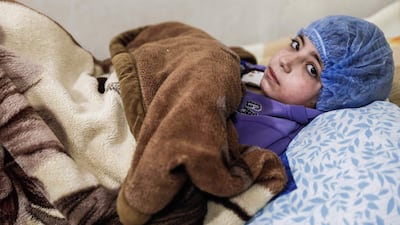DOUMA // In a stuffy underground medical centre in a town under siege, 14-year-old Dania was about to undergo her first ever dialysis session.
Wailing in fright, she was one of dozens of patients being treated for renal insufficiency inside a basement-turned-clinic in Douma, the largest town in the rebel stronghold of Eastern Ghouta near Damascus.
“It’s a good thing she came in today. I’ve never seen results this high in my life,” kidney specialist Mohammad Sadeq told Dania’s mother solemnly as she wiped the tears from her daughter’s face.
Renal insufficiency limits the kidney’s ability to filter waste out of the bloodstream or regulate hormones, and is typically treated with several dialysis sessions per week.
But for people living in Douma, encircled by government forces since 2012 and with no deliveries of humanitarian aid since October, the condition is becoming increasingly deadly.
Three people died of kidney failure in Douma last month. In 2016, it was three people in the entire year.
“Because of the lack of supplies, our patients have to have fewer sessions,” said Mr Sadeq, whose centre is the only place offering dialysis in all of Eastern Ghouta. “Each patient used to have two to three sessions per week. Then it became one a week. And with the delay in receiving the necessary supplies, we were forced to decrease it to one session every 10 days. We could save lives if we just had the material.”
The centre was founded in 2013 with seven dialysis machines, medicine, and other equipment recovered from previously state-run clinics nearby.
Each dialysis session requires needles, membranes and special cleaning serum, but patients also take vitamins, hormones, and blood pressure medication between sessions.
When the siege of Douma began in 2012, the centre began relying exclusively on fairly regular deliveries of equipment and medicine by the United Nations and the International Committee for the Red Cross.
But that all stopped in October when government forces tightened their encirclement of the town. Since then, only a single life-saving delivery from the Red Crescent has made it though, on March 9. There is enough for 250 dialyses, which will last only a month.
“If Dania had come in three days earlier, I wouldn’t have been able to do anything for her,” Mr Sadeq said. “That delivery saved that child’s life.”
Not everyone will benefit from the re-supply. Khayriyah, 58, stared in disbelief when Mr Sadeq told her he could not accommodate her for another week..
“Well, if you don’t see me then, make sure to tell me to ‘rest in peace’,” she replied.
Mona, 30, has been a regular patient at the centre since it opened, and the shortages have hit her hard.
“The dose we’re currently taking is so low that I can’t even stand up on my own two feet,” she said. The siege has made the medication she needs between sessions too hard to come by or too expensive.
Most besieged areas in Syria are surrounded by Syrian government troops and allied militia, although rebel forces and ISIL have also used the same tactic.
For Waleed Al Shammaa, 65, his kidney condition is exacerbated by high blood pressure – a direct consequence of stress.
As their situation becomes increasingly dire, for the kidney patients of Douma, the underground centre is their only hope.
“Since the Syrian uprising started, our lives have been tied to this machine. If the dialysis stops, so do our lives,” Mr Al Shammaa said. “This centre is the only thing we’ve got. It’s either the dialysis centre or the grave.”
* Agence France-Presse

